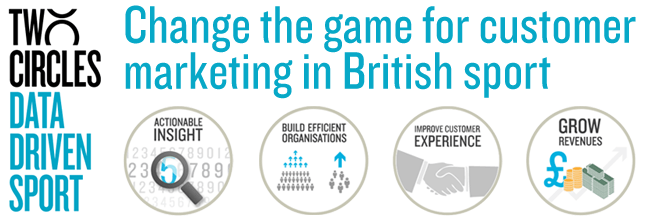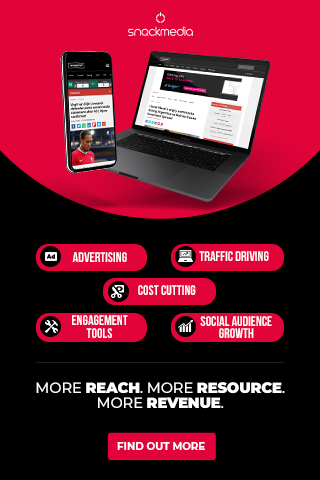Inside Two Circles: Chatting Data & Sport with the BTSIA Agency of the Year 2014
At our last Digital Sport London one of our guest speakers was Phil Stephan from Two Circles, who earlier this year were named winners of the coveted Agency of the Year title at the BT Sport Industry Awards in London.
They are a sports agency with a difference – they put data at the heart of their approach.
Phil managed to fit a lot of interesting information into his 10 minutes at the June event at The Bakery in Old Street. He caught the imagination of many in the room and I for one was left wanting to find out more. So I caught up with Phil recently to do just that…
Dan: For the benefit of anyone who may not have heard of Two Circles, can you tell us briefly about the company and your role there?
Phil: Two Circles is a data-driven sports agency. We work with sports rights holders and their sponsors and help them become insight-led, customer-focused, profitable organisations. Whether they are hoping to sell more tickets, grow participation or increase sponsorship revenue, we help our clients use data to achieve their business objectives. We work with, to name a few, the England and Wales Cricket Board, Ascot Racecourse, Lord’s, the KIA Oval, Valencia CF, Fulham FC, Harlequin FC, Wasps and Youth Sport Trust.
We were recently named Agency of the Year at the 2014 BT Sport Industry Awards having been in existence for less than three years. As Head of Client Services, I’m responsible for making sure that we consistently deliver great work for all of our clients – whether that means ensuring that the right technology is in place, that strategy and campaign planning is sound, or that deliverables are produced to a high standard. Most importantly my job is to make sure that our work is always helping the client solve their problem!
Dan: There is more and more talk about data and how it should be used at the moment – in sport and in business more generally. How important is it for a sports organisation to get this right?
Phil: It’s absolutely fundamental. The biggest players in other industries have placed data at the heart of their business strategies and have embraced it as a new currency over the course of the past ten years or so. Tech giants like Google and Facebook are data businesses – they exist to collate and monetise user data, while supermarkets like Tesco and Sainsbury’s run their businesses on data – who is buying, what they’re buying, and where. Sport is behind the curve. (In fact, it’s ironic how little sport has done with data to drive commercial strategy, while simultaneously making such extensive use of it to drive improvements to on-field performance.)
This has to change – sport has no more divine right to anyone’s time than Facebook, music, retail or movies, so if it fails to realise the value of data while other industries continue to deliver increasingly personalised experiences, it simply will not be able to compete. Whether the objective is to launch a successful new product for your fans or grow participation within a certain demographic; to change a pricing structure or activate a sponsorship deal; to fill a new stadium or boost digital engagement, data should be informing and supporting business strategy across the board and sport is only just waking up to its potential.
Dan: What are some of the common problems you see? How do you work to overcome them?
Phil: The problem we see again and again in this space is a lack of strategy. Often sporting organisations will make the decision to invest in data projects without first clearly defining their objectives for doing so and specifying how the project will then be utilised to deliver these objectives. Building a single customer view, developing a segmentation model, undertaking market research etc. are not ends in themselves and will not spontaneously deliver return on investment without strong strategic foundations being laid first.
Even projects with firm foundations can fail, however, if they are not delivered correctly. Too many times we see traditional consultancies or tech firms deliver systems/projects and then hand it over to their clients who lack the resources and/or strategies to get the most out of them. Two Circles exists to circumvent these issues – we have a blend of skills and experience to provide bespoke end-to-end solutions to solve our clients issues and realise their business opportunities. We work in partnership with our clients to ensure our work with them is successful. We won’t enter into a relationship if we don’t know that it will deliver ROI for the client.
Dan: So what steps can rights-holders take to start using the vast reams of data they hold to deliver on their commercial objectives?
Phil: The first step is to define what you want to achieve – do you want to grow attendances? Grow participation? Increase non-matchday revenue? The data, systems and approaches required to deliver each of these objectives are totally different and you can easily find yourself investing your time and resource in the wrong areas if you haven’t clearly defined what you are trying to achieve.
Unless you have the budget to hire developers, analysts, a customer marketing team and experienced professionals with experience in data strategy most organisations will need to outsource some or all of their data servicing requirements. The range of data sporting organisations have at their disposal is quite unique to this industry so finding a partner with sports industry experience is key to success. A good partner will help unlock the value of the data you have at your disposal. A bad partner will sell you a system you don’t need and can’t use to achieve your business objectives.
Dan: Social media has added even more data to the fold with sports typically having thousands, if not millions, of fans across multiple platforms. How can they tie this into their overall business and even start producing revenue from it?
Phil: Social media is an incredibly valuable customer touch-point for any sporting organisation – fans disclose data about themselves that can provide valuable insights that should be informing how you manage your relationship with them. The challenge with social data is gathering, structuring, analysing and acting on the right data in the right way.
Too many sporting organisations are focused on growth for its own sake. In isolation, the number of followers or likes that an organisation has doesn’t mean much and the insight you can extract from the platforms’ out-of-box analytics is limited – the key is to overlay social data with other data sources so you know who your followers are and how they behaving. Only with this deeper understanding can rights-holders derive maximum value from social media.
Dan: You’ve obviously been doing a great job over these last 3 years. If you could pinpoint a couple of success stories you’ve worked on – who would they be and why?
Phil: We take great pride in our work with all of our clients – our 100% renewal rate is testament to that. I have to respect the commercial sensitivity of a lot of our ongoing work, but one example I can speak about is our Ashes Ballot and Membership campaign with Surrey County Cricket Club last year.
We’re particularly proud of this campaign not just for the strong financial results it delivered, but also because it won a Marketing Week Data Strategy Award earlier this year, in a category that included a number of major brands supported by global marketing agencies – the likes of easyJet, Financial Times and Proctor and Gamble. For a cricket club to emerge victorious in that context was some achievement and we’re very proud to have played a part in it. If you’d like to read a little more about it, click here: http://www.marketingweek.co.uk/events/email-marketing-b2c/4009241.article
Dan: Finally, with the amount of data sports businesses will be able to access only going to increase. What does the future hold for Two Circles and how do you see the sports industry evolving as the digital age evolves?
Phil: The rise of digital is making it easier and easier for organisations to manage the relationships they have with their customers. With access to granular, customer-level data from social channels, websites and other digital touch-points, sports organisations will have an increasingly full and detailed picture of what their customer base looks like, how they behave and how they feel. Digital also increases rights holders’ ability to communicate with their customers on a one-to-one level.
For us at Two Circles, and for the industry more broadly, the combination of these two changes is allowing us to deliver increasingly personal customer experiences, rather than the “one size fits none” approach that sport has been known to deliver in the past. It’s an exciting time to be working in sport – I think we are on the brink of a fundamental shift in the way the business of sport operates, driven by the discovery of the valuable tool it has at its fingertips: data.
Thanks to Phil for taking the time out to speak with me. If you’d like to find out more about Two Circles then you can do at their website, http://www.insidetwocircles.com
About author
You might also like
Playfinder is bringing an ease to playing sport that’s seeing an increase in grassroots participation across the country
The term ‘grassroots’ sport is used more and more in sporting discussion as governing bodies make increasing efforts to improve facilities available to children and older to offer more accessible
Ahead of The Players’ Championship, analysis shows how the wind helps Sawgrass bare its teeth
We know that the wind plays a vital role on the 17th tee at Sawgrass. Engineering consultancy WSP show how just how difficult it is.
Putting on a show – Steve Elworthy on the delivery of this summer’s Cricket World Cup
The Cricket World Cup is a logistical challenge for England 2019. Hear from the man who’s running the show.










